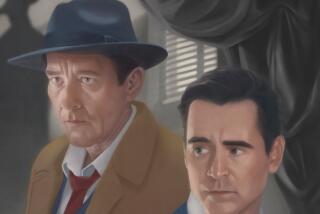Book review: ‘When the Thrill Is Gone’ by Walter Mosley
Walter Mosley’s latest, “When the Thrill Is Gone,” is the third installment (after “The Long Fall” and “Known to Evil”) in the series featuring Leonid McGill, a tough, philosophic African American private detective who plies his perilous trade in today’s New York City. The book is as complex and thoughtful as its narrator-hero and is also smartly paced, well plotted and elegantly written. And yet, when compared to the author’s initial, career-igniting novels about Easy Rawlins, it seems to lack a key ingredient: originality.
For example, early on in the new book, a beautiful woman visits McGill’s office and asks him to investigate her fabulously wealthy husband, whom she suspects of infidelity and possibly of murder. McGill knows she’s lying about something, but he takes the case anyway. Since the early 1920s, when readers of Black Mask magazine were introduced to hardboiled sleuths in stories by writers such as Carroll John Daly and Dashiell Hammett, hundreds of gumshoes have been sent on similar quests by similarly devious females.
This is not the only time-honored trope present. There’s the detective’s loyal young secretary, an honest cop who’s both his nemesis and his begrudging admirer, assorted colorful helpers and, of course, the big city itself, with its mean streets and meaner denizens.
Even McGill’s self-analytic musing doesn’t quite set him apart from his fictional forebears. He tells us in the new novel: “I had killed men with my bare hands, taken enough punishment to have died many times over myself. I had enemies and a special policeman assigned to bring me down and send me to prison.”
Compare that to the comment by another New York shamus, Daly’s Race Williams, in 1927’s “The Snarl of the Beast,” one of the very first private eye novels: “The police don’t like me. The crooks don’t like me. I’m just a halfway house between the law and crime.... My ethics are my own. I’m not saying they’re good and I’m not admitting they’re bad.”
When you’re a stylist as talented as Mosley, there’s nothing inherently wrong in treating a long-popular sub-genre to a polished prose update. Butunlike his Rawlins books that achieve uniqueness by taking us to post-World War II Los Angeles as viewed through a black man’s eyes, a place as intriguingly unfamiliar to most readers as Middle-earth, McGill’s New York isn’t that much different from John Shaft’s. Or Mike Hammer’s, for that matter.
As if to compensate for the series’ reliance on traditional detective trappings, Mosley presents his hero with an ungodly amount of professional and personal problems. In addition to investigating the possibly homicidal husband, his stepson is engaged in several criminal pursuits. Though he no longer loves his unfaithful wife, he stays with her because he feels the children need him. A woman he does love and who loves him refuses any intimacy as long as he remains married. His best friend is dying of cancer. A young man he’s mentoring is being pursued by leg-breakers. He’s on the verge of being arrested for a crime he did not commit. And he’s seeking a home for children orphaned by a hit man while being stalked by that same psychotic killer.
Keeping track of this number of plots and sub-plots and their attending characters is a job that should confound even a master literary juggler.
Mosley takes it in stride, performing his act with remarkable clarity before gracefully gathering a majority of the loose ends for a tidy, satisfying conclusion.
In the company of other series about contemporary private eyes, the McGills hold their own. It’s only when stacked next to their creator’s premier works that they come up a bit short.
Lochte is the co-author, with Al Roker, of “The Midnight Show Murders.”
More to Read
Sign up for our Book Club newsletter
Get the latest news, events and more from the Los Angeles Times Book Club, and help us get L.A. reading and talking.
You may occasionally receive promotional content from the Los Angeles Times.







